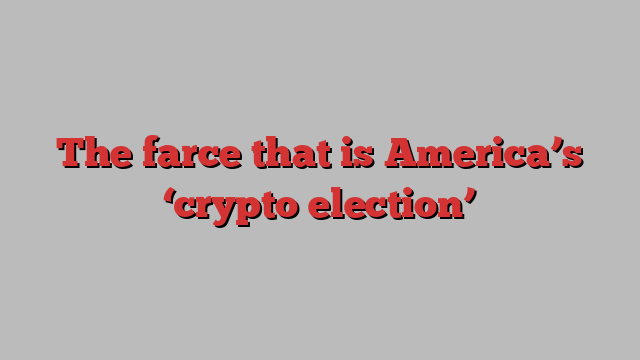
Unlock the US Election Countdown newsletter for free
The stories that matter on money and politics in the race for the White House
November 5, by all accounts, is set to be America’s first “crypto election”. Hundreds of millions of real dollars have poured into pro-crypto political action committees. Kamala Harris has talked about encouraging “innovative technologies”. Donald Trump, her rival for the presidency, has decided that bitcoin isn’t “a scam” after all, embarked on a series of crypto ventures and promises to make America “the crypto capital of the planet”.
“The crypto voter is real, bipartisan and ready to engage this cycle,” the executive director of lobby group Stand With Crypto, founded and funded by America’s biggest crypto exchange Coinbase, enthused last week. (The group gives politicians grades for their crypto stance, and Trump — unusually — gets an A.)
But reader, I must level with you right off the BAT (a digital token): the crypto voter is not, in any substantive sense, real. Aside from the small group of men (OK, mainly men) whose livelihoods now depend on this digitally indigenous fluff, most Americans have rather bigger things to worry about — food prices, healthcare, the jobs market, or the general state of their nation, maybe.
The idea, therefore, that there is a “constituency” of crypto voters needing to be pandered to, whose top issue is making sure that exchanges and other companies aren’t too heavily regulated, is fanciful. And yet that is the narrative being pushed by the industry, along with some creatively interpreted statistics.
“Crypto is a national priority . . . 52mn Americans own crypto and want their voices to be heard in the upcoming elections,” claims Stand With Crypto (the 52mn is certainly contested). “Nearly nine in ten Americans believe the financial system is overdue for an update. Yet, US policymakers seem content on maintaining the status quo, rather than fulfilling their responsibilities.”
This, presumably, means making sure people like multibillionaire Coinbase CEO Brian Armstrong can continue to get richer. Because if it’s really the crypto owners being considered here, they are doing just fine, thanks (or the ones lucky enough to choose an exchange that didn’t steal it all, anyway).
Despite the Biden-Harris administration being “very hostile” to crypto, according to Trump — “extremely hostile, like nobody can believe” — bitcoin has more than quadrupled in price since the 2020 election, reaching a record high earlier this year. The estimated value of the entire crypto market has almost sextupled. If it’s US jobs we’re talking about, industry figures show almost a third of the world’s crypto workforce is based in the US.
Crypto is also responsible for almost half of all corporate spending on the election so far, with the pro-crypto Fairshake super Pac having raised more than $200mn alone.
But while the fact that there is a huge amount of both crypto money and crypto rhetoric in this campaign is in no doubt, does either candidate really care? Let’s look at Harris’s own words. Until recently, there were none. But last Sunday at a Wall Street fundraiser, she finally said: “We will encourage innovative technologies like AI and digital assets, while protecting our consumers and investors.”
For all those getting excited about her sudden conversion — Stand With Crypto even graded her a B, for being “somewhat pro-crypto”, before downgrading after a backlash — let me make clear my own thoughts: Harris couldn’t give a flying Satoshi. She has promised nothing at all. Her comments were designed not to alienate the tech world by coming across as heavy-handed while keeping those who favour stronger regulation on side.
Trump has sold four collections of NFTs, and generously offers Americans the “chance to contribute to the campaign with cryptocurrency”. But if you think his interest goes beyond his own prospects, you too should brace for disappointment. He might be lauded by Coinbase’s chief policy officer for his “concrete and visionary positions” but he doesn’t seem to take the whole thing very seriously. “Have a good time with your bitcoin and your crypto, and everything else that you’re playing with,” he told July’s bitcoin 2024 conference.
Neither does Trump display much understanding — which, to be fair, he at least owns up to. At the launch of his and his sons’ latest foray into crypto, World Liberty Financial, he compared it to learning Chinese. What the company will do remains unclear.
Still, at least the venture’s “DeFi visionary” seems to get it. “Barron knows so much about this,” the former president said of his 18-year-old son. “He talks about his wallet. He’s got four wallets or something, but he knows this stuff.” Remember remember the fifth of November. Cluelessness, claptrap and grift.